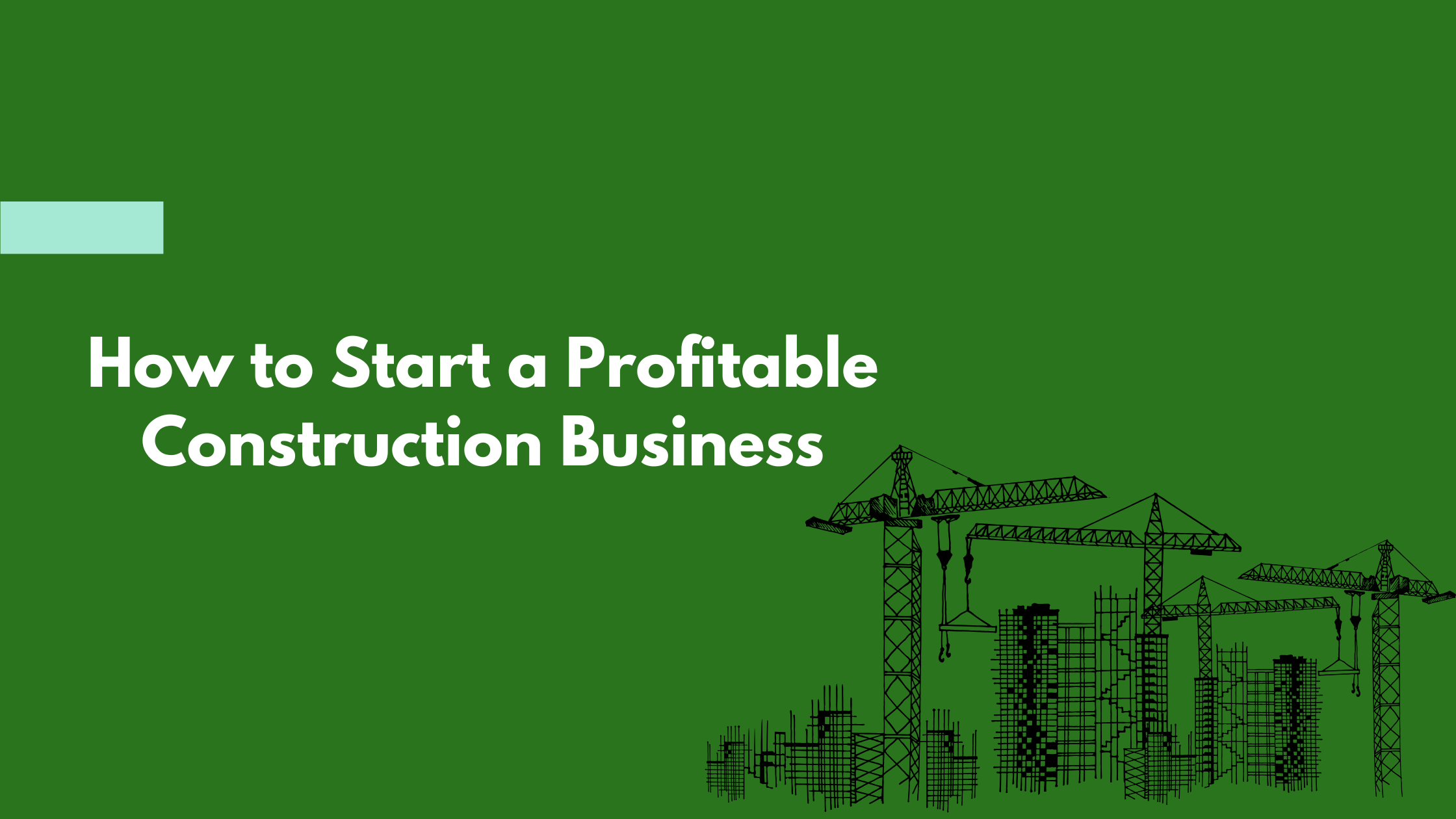Starting a construction business can be a game-changer if you do it right. The industry is booming, and demand for skilled contractors keeps rising.
But let’s be real, this isn’t just about grabbing a hard hat and hiring workers. If you’re serious about how to start a profitable construction business, you need a clear strategy, proper legal setup, and a marketing plan that keeps the projects rolling in.
This guide will walk you through everything, from business planning and financing to hiring skilled workers and getting clients. By the time you finish reading, you’ll have a solid roadmap for launching and scaling a successful construction company.
Table of Contents
Understanding the Construction Industry Landscape
Before diving into the business side, you need to understand the market. The construction industry is one of the most lucrative fields, covering everything from residential buildings to commercial properties. But competition is fierce, and many startups struggle with pricing, finding skilled labor, and keeping a steady stream of projects.
If you’re researching how to start a profitable construction business, begin with a thorough market analysis. Identify trends, understand customer needs, and pinpoint areas where you can stand out. You might specialize in eco-friendly construction, luxury renovations, or smart home installations; whatever gives you an edge in the market.
Knowing your competitors is just as important. Study what other construction companies are doing right and where they fall short. If their customer service is weak or they lack modern solutions, that’s an opportunity for you to shine.
Developing a Business Plan That Works
A solid business plan is your blueprint for success. Without it, you’re just guessing your way through. If you’re serious about how to start a profitable construction business, take time to map out your goals, strategies, and financial plan.
Start by defining your niche. Are you focusing on residential, commercial, or government contracts? Each has different challenges, licensing requirements, and revenue potential.
Your business plan should also include:
- Target audience. Who are your ideal clients? Homeowners, real estate developers, or businesses needing renovations?
- Competitor analysis. What are other construction businesses doing well? Where can you outperform them?
- Financial plan. How much startup capital do you need? What’s your pricing strategy?
The better your business plan, the easier it will be to secure financing, attract clients, and scale your operations.
Legal Requirements and Business Registration
Legal compliance is non-negotiable in construction. One mistake here, and you could face fines or business shutdowns.
Start by choosing a legal structure. Many contractors register as LLCs to protect their personal assets. Others go for sole proprietorships, which are simpler but riskier.
You’ll also need licenses and permits. Depending on your location and niche, this might include a general contractor license, specialty trade licenses, and local building permits. Make sure you comply with OSHA safety regulations to avoid costly violations.
And don’t forget insurance. Construction involves risks, so general liability insurance, workers’ compensation, and property insurance are essential. These protect you from lawsuits, accidents, and unexpected damages.
Handling legal matters upfront is a crucial step in how to start a profitable construction business. It ensures smooth operations and builds credibility with clients.

Securing Financing and Managing Costs
Construction businesses require significant startup capital. You’ll need funds for equipment, materials, labor, and marketing. Poor financial planning is one of the top reasons construction startups fail, so managing your budget wisely is key.
Start by estimating your expenses. Factor in office space, tools, safety gear, and employee salaries. If funds are tight, leasing equipment instead of buying can cut costs.
Consider your financing options. Traditional bank loans, SBA loans, and private investors are common choices. Some cities even offer grants for small construction businesses.
Once you secure funding, focus on budgeting. Track expenses, avoid unnecessary purchases, and reinvest profits wisely. Mastering financial management is one of the most important steps in how to start a profitable construction business.
Building a Skilled Workforce
Your team is the backbone of your business. Skilled, reliable workers can make or break your reputation.Hiring the right people starts with defining roles. Do you need project managers, carpenters, electricians, or subcontractors? Find experienced professionals who align with your quality standards.
Investing in training and certifications is just as important. Construction technology evolves quickly, and staying updated on the latest methods can give you an edge.
Safety should also be a top priority. Construction sites are high-risk environments, and cutting corners on safety can lead to injuries, lawsuits, and fines. Strict safety protocols keep your team protected and your projects running smoothly.
If you’re wondering how to start a profitable construction business, remember, your team is your biggest asset. Hire well, train consistently, and prioritize safety.
Investing in Tools and Technology
Technology is revolutionizing the construction industry. From automated machinery to AI-driven project management tools, investing in the right tech can save time and money.
Start with essential equipment. Depending on your niche, this could include heavy machinery, power tools, or specialized materials. While buying everything upfront isn’t always necessary, don’t sacrifice quality for cost.
Next, consider software solutions. Project management software can streamline operations, track budgets, and improve communication with clients. If you don’t know how to make a website for construction services, work with experts in construction services website design to create a site that attracts clients and showcases your work.
Staying ahead of technological advancements gives you an advantage over competitors still relying on outdated methods.
Marketing and Branding for Your Construction Business
Even if you’re the best builder in town, you won’t get clients without strong marketing. A solid brand and digital presence are non-negotiable in today’s market.
Start with branding. Your business name, logo, and messaging should reflect professionalism and reliability. Clients should immediately trust your expertise.
A website for construction business is essential. If you don’t have one, you’re already losing potential clients. Your site should include project portfolios, customer testimonials, and easy contact options. If you’re unsure where to start, construction services website design experts can build a professional site optimized for search engines.
Search engine optimization (SEO) is another key strategy. When potential clients search for construction services, your business should appear at the top. That’s why a well-optimized website for construction business is a game-changer.

Scaling Your Construction Business for Long-Term Success
Once your business is up and running, growth should be the next focus. Expanding your services, hiring more workers, and taking on bigger projects can increase your revenue.
Networking with real estate developers, architects, and local business owners can open new opportunities. Consider partnerships that bring in steady contracts instead of relying on one-time projects.
Customer retention is just as important. Repeat clients and word-of-mouth referrals are gold in the construction industry. Providing excellent service, maintaining strong communication, and delivering on promises will help you build long-term relationships.
If you’ve been asking how to start a profitable construction business and sustain it long-term, focus on consistent quality, smart investments, and building a strong brand.
Final Thoughts
Figuring out how to start a profitable construction business isn’t just about laying bricks, it’s about strategy, planning, and execution. Success requires more than technical skills; you need strong financial management, a skilled team, and an unbeatable marketing plan.
A professional website for construction business will set you apart from competitors, helping you attract more clients and establish credibility. If you’re unsure how to make a website for construction services, let the experts handle it.
At Texttot Digital, we specialize in construction services website design that drives leads and boosts business growth.
Now that you have a clear roadmap, it’s time to take action. Plan smart, build strategically, and grow your construction business into a powerhouse.


